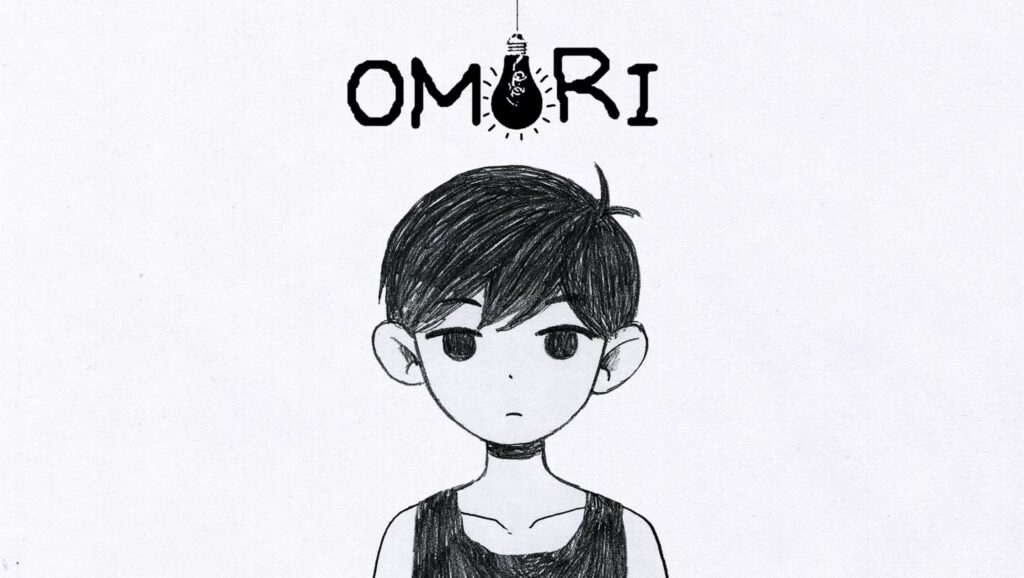
Image Source: Omo Cat
Omori: Notes on Mourning
TW: Spoilers for Omori and references to suicide, depression, and grief.
Dear Reader,
A little black box arrived for you earlier today. When you open it, you find a copy of Omori by Omocat inside; a pencil-sketched young boy aimlessly gazes under a black light-bulb on the cover. You’re captivated by hand-drawn Polaroids gracing the back, each depicting our various heroes — Kel, the hot-headed ball of joy; Aubrey, the anxious moral compass; Hero, the arachnophobic chef (and Kel’s older brother); and Omori, our mute and colorless host — enjoying their life in the mythical and wacky world of Headspace.
You decide to play the game, and the bright emptiness of White Space shocks you; this isn’t what you were promised. Drawings of blood and guts fill Omori’s notebook, disembodied hands slither along the floor, and you find a knife just laying around. Entering the photo realistic door, which at first terrified you, saves you from wandering the void. It places you back with colors and your friends, back somewhere that whiteness cannot harm you. The day goes swimmingly: the emotion-focused, turn-based combat is charming and just fun enough, the world is populated by quirky monsters, and you cannot help but be charmed by Mari, Omori’s older sister, who provides picnics and positivity and allows you to save your game.
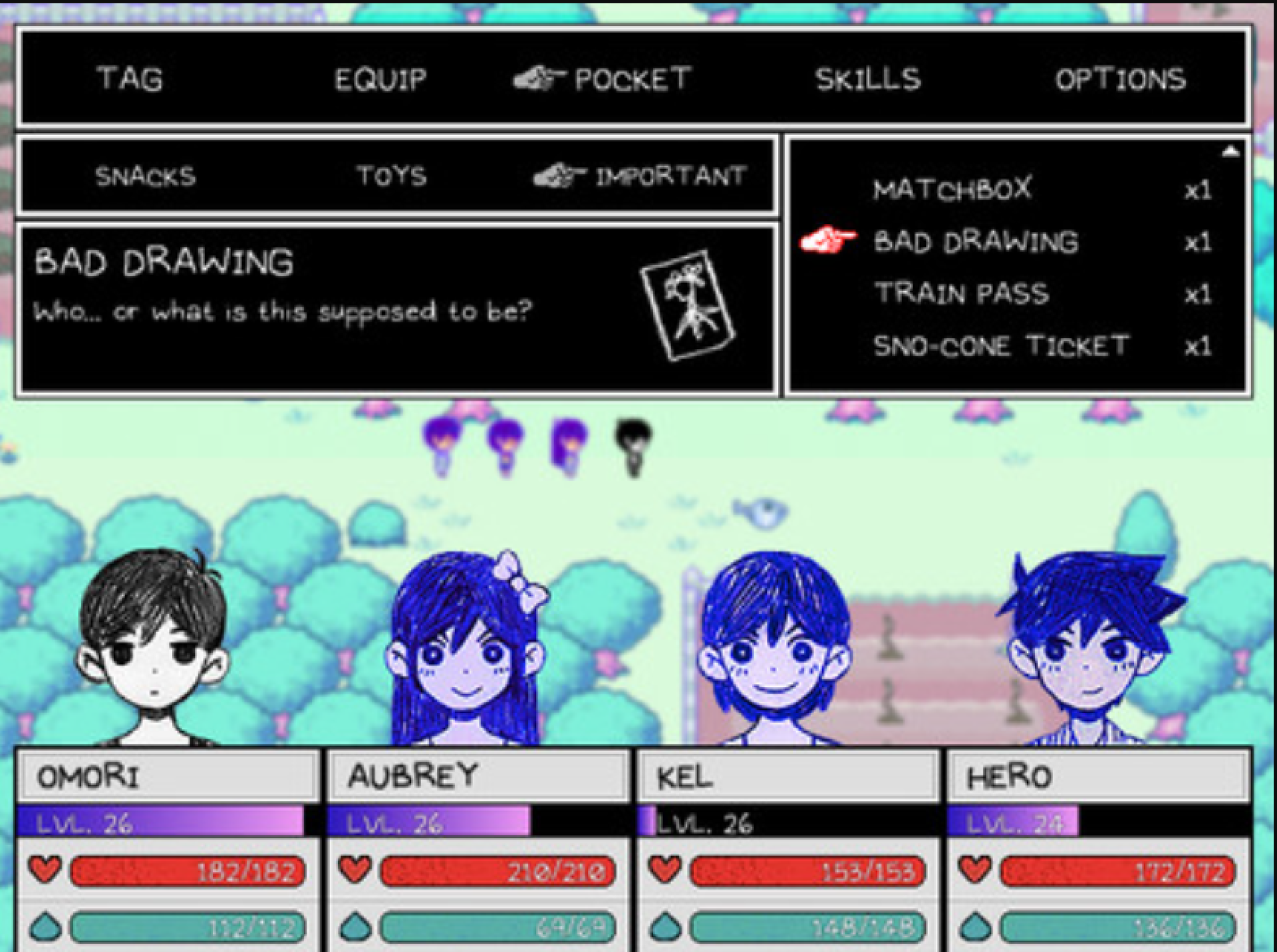
You quickly realize that everything that you just played, everything in Headspace, isn’t real. Omori is an imaginary avatar for Sunny, a hikikomori emotionally removed from the world after Mari died three years ago. Your fearsome foursome doesn’t exist anymore — Kel plays sports, and only talks with Sunny for the first time in years because Sunny’s moving; Aubrey’s bright pink hair and spiked bat strike fear into the hearts of nerds everywhere; and Hero left town for college, desperate to run away from his grief. No one knows how to mourn Mari: sister, role model, soul mate, friend. You realize you don’t even know how to mourn her. Is she a collection of pixels? A person? An idea? In an effort to understand your emotions, you take out a pen and paper and you begin to write letters, one for each character. You think it might be something that they need to hear; you desperately hope it is enough.
Dear Kel,
If I were to ask how you were doing, would you answer me honestly? Even after years of therapy, I probably wouldn’t. It’s so easy to swallow everything we feel into the pit of our stomachs, send it down to the soles of our feet, and disperse it into the Earth. In other words, it’s easy to lie.
It’s often subconscious, blocking our emotions so they don’t affect this immediate moment, and reducing problems into bite-sized, manageable chunks. People falsely view this as positivity, not understanding that our rationalization that things will get better stems from a fear of everything getting worse. Seeing the seams in the world, we know that the sky can fall at any moment, so we celebrate loudly in the hopes of making these precious minutes of joy count.
For all its strength, positivity is also a weakness, a mask to hide behind in an attempt to make life more bearable for those around us. Taking the weight of tragedy off of Hero only adds to your own burden, but is that not worth it to see your older brother smile again? Is it not worth it to hear him laugh again? So you stack and stack, the pile teetering with each tenuous step, threatening to collapse. But you don’t let it.
It’s a difficult balance, grabbing everything we can in an effort to keep those around us happy. Stapling on a smile, manufacturing a laugh, easing someone else’s troubles, these actions are the least we can do. Sometimes, though, people do not want to be helped and they do not want their load lightened. But it feels wrong, stepping back to let someone we care about stew in sadness; it feels like we aren’t doing enough.
When Hero couldn’t get out of bed, wouldn’t eat, wasn’t trying, you talked to him. Told him how much you miss him. How worried everyone is about him, how everyone wants him to get better. That Mari wouldn’t want to see him like this. And he got angry. He started yelling, tears streaming down his face as he screamed at you. Your parents rushed in to calm him down; they didn’t notice you crying too.
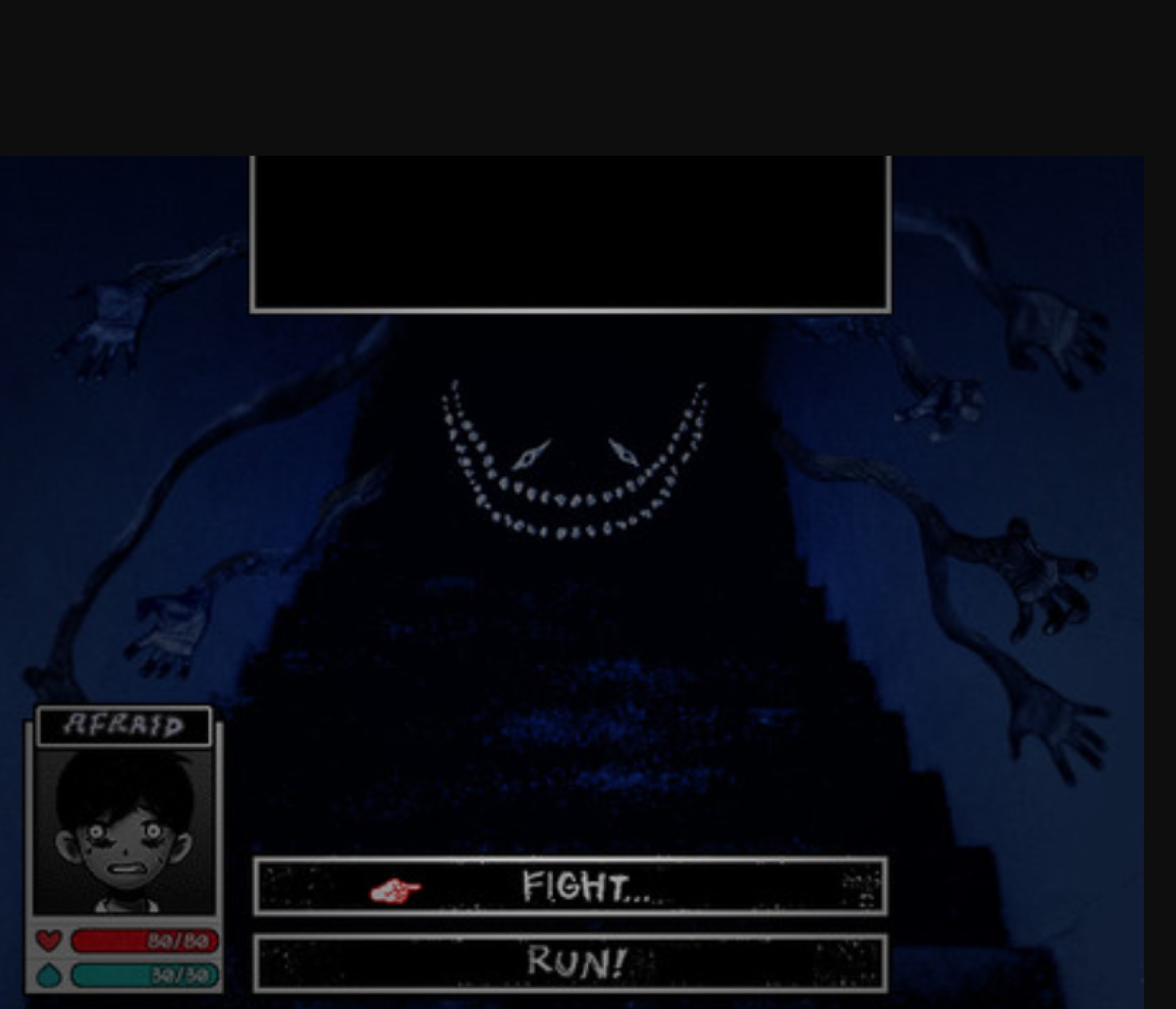
Aubrey thinks the speed you continued living your life after Mari’s death was callous, a failure to mourn appropriately that disregarded the emotions of others and the gravity of the situation. She misunderstands the necessity of moving forward, the shark-like mentality that any pause means certain doom. Any hesitation, however slight, would cause our tower of burdens to tumble, crushing us beneath the emotional rubble.
Having spent so long focusing on others, we don’t know how to ask for help, the language foreign and the words ill fitting in our mouths. Our struggles go ignored, hidden behind the mask of constant positivity to fester and spoil, while those around us receive all the attention. It sounds so selfish to complain, so entitled and dismissive of other people’s problems to discuss our own. So we bite our tongue and grit our teeth, playing our role as caregiver to perfection because someone has to. It doesn’t matter how much we grow to resent it
Hero noticed you crying, and although he was the one that caused it, he hugged you, apologies streaming out in the place of tears. In that moment, you needed someone and he was there. It’s okay to ask for help from those you’ve spent your entire life helping. They can grab a burden from your back and put it on their own, break one in half to share the weight, or simply be there to rescue you from the rubble. It is okay to not be okay.
Dear Aubrey,
Close your eyes, clasp your hands, speak your mind. When you pray, do you think someone hears you? The other people in the congregation, do they register your prayer? Or are they too caught up in their own lives — their personal sins, situations, and celebrations — to hear your words? Prayer doesn’t mean confession, although I have no doubt that you ask for forgiveness; most likely, you’re after comprehension, a divine reasoning behind why things happen. There must be some logic that dictates the universe, some grand plan that we are simply too small and inconsequential to understand, otherwise what’s the point? There has to be a point.
Uncertainty gnaws at your insides, eating your heart a little more with each passing day. Love falters and anger, thick and hot, drips into the void, the sound of each new drop reverberating across your atriums and ventricles. Anger at your friends, who in their mourning abandoned you and set fire to your shared past, the photographs and memories scribbled out with a black marker. Anger at your parents, who never cared enough to see your struggles and left you to fend for yourself. Anger at the divine, who, despite being all-powerful and all-knowing, continues to allow tragedy to befall its creations.
You’re even angry with Mari, although you won’t admit it. Who could? For reasons you will never understand no matter how hard you try, she left. And some small part of you resents her for it: for leaving you alone, giving up hope, never asking for help, shattering the one stable family in your life. You hate her for dying, and you hate yourself for feeling that hatred because blaming someone for their own death is shameful.
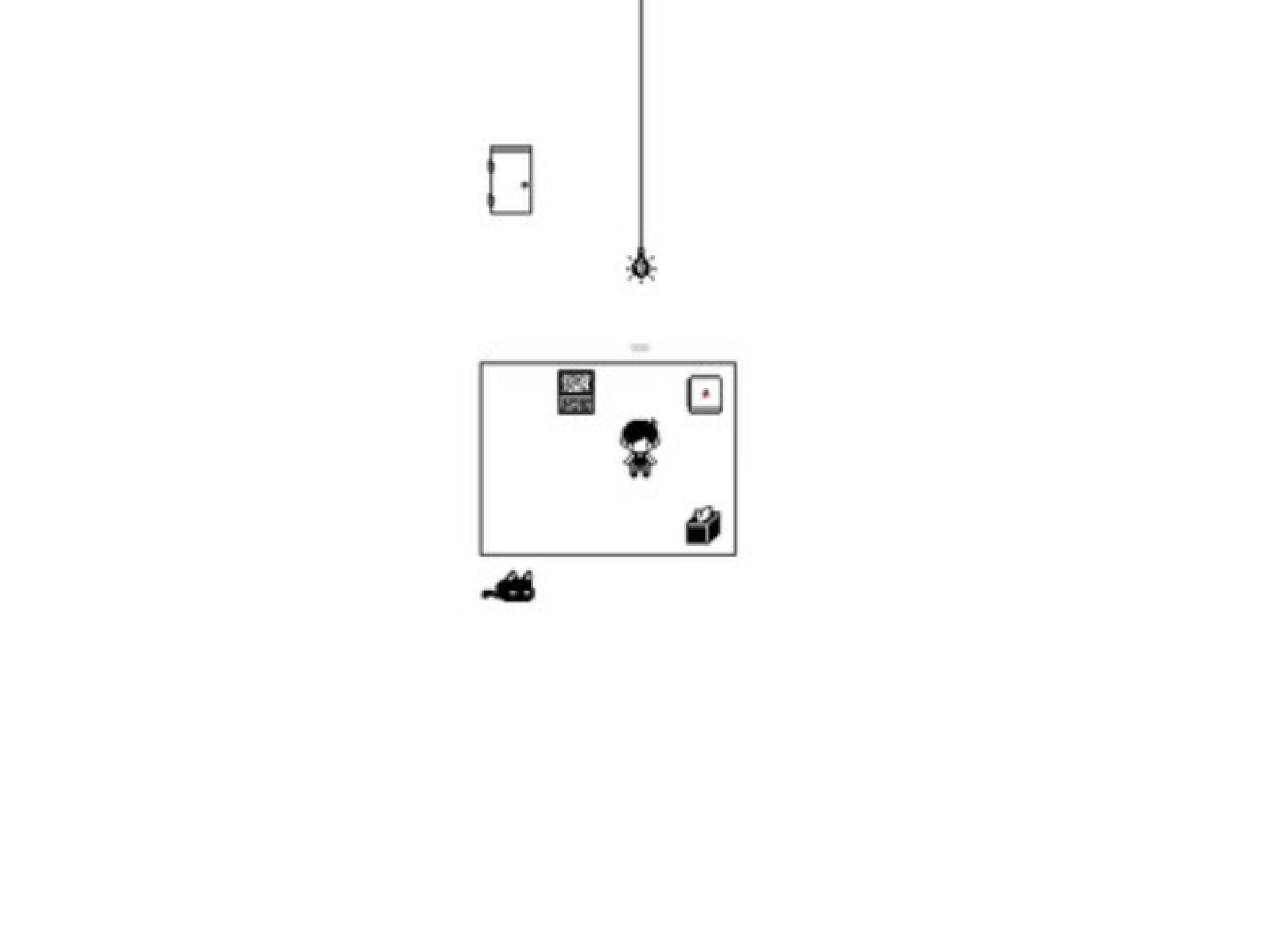
You’ll do anything to make the shame go away. You’ll abandon the friends who abandoned you, burning any surviving bridges to make clear there’s nothing left between you all anymore. You’ll dye your hair pink, arm yourself with a nail-studded bat, and lead the Hooligans, a ragtag group of delinquents who vandalize your once beloved Faraway Town and bully anyone who dares cross your path. You’ll seal off all emotions except for anger, the viscous goop flowing through your veins and keeping you alive. You don’t remember how to live any other way.
You’ll even go to church every single week. You’ll sit in the pews, quiet and unobtrusive, simply a part of the congregation of broken souls searching for answers. Leaving your life at the door, no one within the four walls can judge you for your actions; adjudication lies in the hands of something greater than humanity can comprehend.
You’ll visit Mari’s grave. Sitting on the grass, the wind softly blowing around you, everything at peace for only a moment, you can feel like you’re on a picnic with her again. You can feel the checkered red blanket beneath your feet as you twirl around, care-free and unsullied by life’s tragedies. You can see Kel’s snoring visage and imagine Hero’s hand resting atop Mari’s, who giggles carefully, not wanting to wake up Sunny on her lap. In these moments, you forget the cold anger and feel the sun warming your skin.
These visits are more religious than all of the sermon’s added together because in these moments, you realize that you don’t need an answer. In these moments, you can forgive Kel for moving on, Hero for going to college, Sunny for isolating himself. In these moments, you can finally start to forgive yourself.
Dear Hero,
It’s a fitting name: Hero. Lover of submarine sandwiches, elder protector of youthful friends, I have no doubt that you found comfort in the name, a role that you were eager to fulfill. Leading the group, cooking the meals, stopping the bickering, these were all tasks that put a smile on your face. Moments languidly stretched across the summer sands; autumn rain trickled down the window while fire warmed your toes. Complaints were minimal, company was good, and all felt right in the world.
Yet, your name also comes with the expectation of perfection and protection, the burdened promise of safety for those within your charge. These are your friends, your family, your loves, the people who make life worth living — it’s easy to believe that all misfortunes are your failures. If only I saw the signs, you tell yourself, if only I tried harder, listened better, loved Mari more then she would still be here.
Regret weighs you down deeper into the depths of depression. Down here, light struggles to break through, concealing your shameful existence in darkness. Down here, water laps up the tears until you are unsure where you end and the ocean water begins; for all you know, you filled the sea you are drowning in. Down here, people are visitors, divers gawking at your pain, unable to do anything other than leave you their mask and canister to prolong our life one breath at a time. Down here, you don’t know who you are anymore.
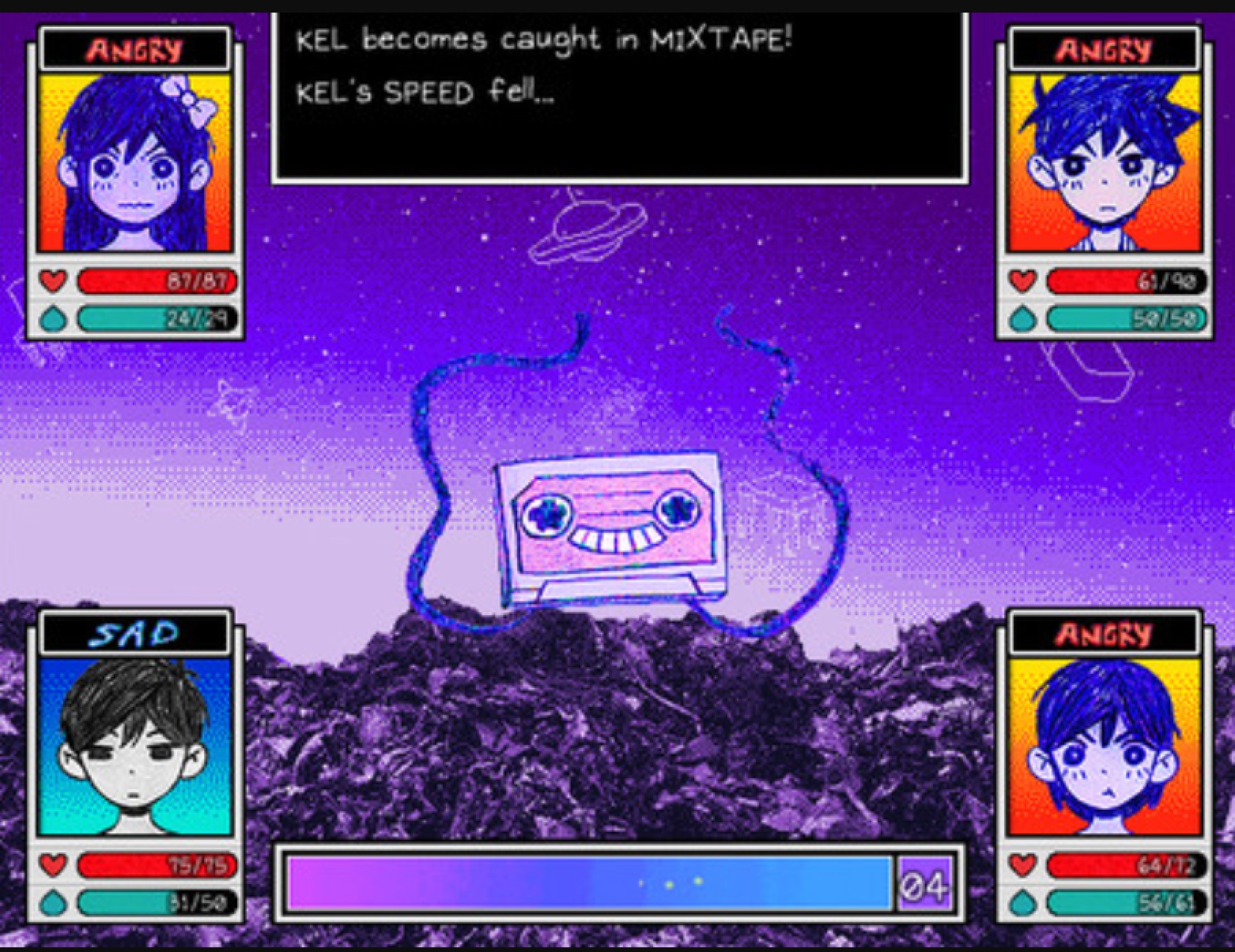
Burying yourself in work, disengaging from your family, deserting Faraway Town for college, you never give yourself the time or space to accept that she is gone. Accepting that means moving on, forgetting about her, living a life without her. You cannot imagine life without Mari; you cannot imagine life at all. You see her peeking around every corner, find her sitting at every piano, hear her laugh at every joke, feel her touch with every celebration. She lives within your memories, fading slightly more each day while the world moves forward and things change.
Catatonic and frozen, you struggle against change, scared that the moment will come where you realize Mari would be unable to recognize you. Growth feels like betrayal of the highest order, a treasonous offense punishable by law. She should be by your side growing with you. Staying still feels like a protest, a desperate boycott against time itself, but you know that you cannot win against nature, don’t you? Struggled limbs falter as you tire yourself out daily. There is more to life than this, I promise. But first, you must let go.
Let go and the weights shackling you will loosen. Let go and you will rise and see the sky once more. People who love you are waiting just above the surface, their hands extended to grab yours and pull you aboard. It’s okay to miss her. Do not let yourself drown any longer.
Dear Sunny,
Grief is a heavy word, the five letters so intrinsically imbued with devastating emotion that it becomes hard to divorce the written word from the emotional experience. Everyone grieves differently, but we all feel the weight pushing down on our hearts and minds, the air escaping from our lungs, our chests hollowing out as the love we had collapses in on itself. A black hole forms, our abandoned emotions condensed into a swirling, dense rage of white space that threatens to consume us entirely.
We spend our entire lives marching toward an ending, yet when one is reached it always feels abrupt, a shocking outcome that given another minute, day, week, month could have been avoided. All the words unsaid age into dust on your tongue; all the hugs not acted upon atrophy your muscles until they ache. Learning to live without someone — because of death or divergence — feels unfair; you would never ask a clock to mark time while missing a cog.
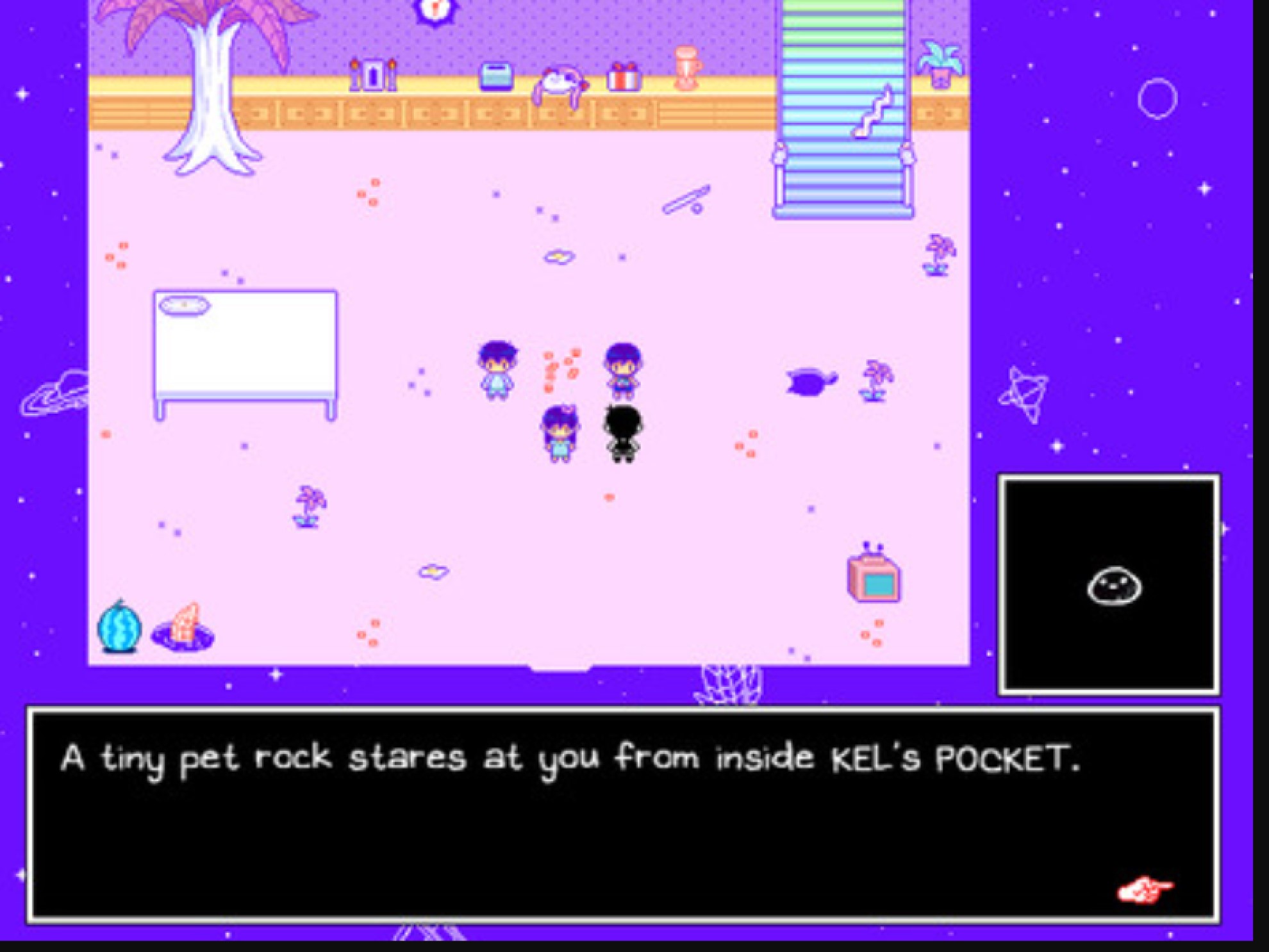
Prose falters in conveying the destructive nature of grief, but we try anyway, hoping that someone else can empathize and share the burden with us. We retreat into fantasies, cozy memories that remind us of when everything was perfect and everyone was around. Darkness seeps through the cracks, reality threatens to burst through the one joy and comfort we’ve found in dark times. But we fight against it, desperately clinging onto what we know, onto who we’ve lost, and never letting go because we cannot handle losing someone for a second time.
Yet living in the past, those wonderfully childish memories, has made you lose track of who you are supposed to be. But to get from then to now, you are forced to remember it: the excruciating, impossible, terrible tragedy. Every second cuts you, bleeds you, bruises and batters your resolve. Wide-eyed and panicked and paralyzed by regret, the same question echoes within you: How could this happen? How could you let this happen?
You want to silence it, so you close your eyes and hum some songs and think of the happy times, but nostalgic ruminations cannot change the irreversible fact that Mari is no longer a part of your life. That accidents become permanent the moment they happen.
Open your eyes, Sunny. Calm down, focus on the people in your life, persist through the pain, and cherish the time you still have. You have spent three years alone, more than enough time living in the past, slowly accepting your part in what happened to Mari. It’s okay, her spirit tells you. It’s okay.
Outside in the world, there is a place for you, and there are people waiting for your return. Nothing will be exactly as you remember it, but that doesn’t mean everything has changed. Gino’s Pizzeria will still groan every time they’re asked for a hero instead of pizza. HOBBEEZ still sells Pet Rocks, comics, and movies, and you can still play Capt. Space Boy’s Space Adventure. And, although they’ve grown and look different, your friends still love you. And they always will.
Rejoin the world. Please, live. Please. Live.
If you like what we do here at Uppercut, consider supporting us on Patreon. Supporters at the $5+ tiers get access to written content early.

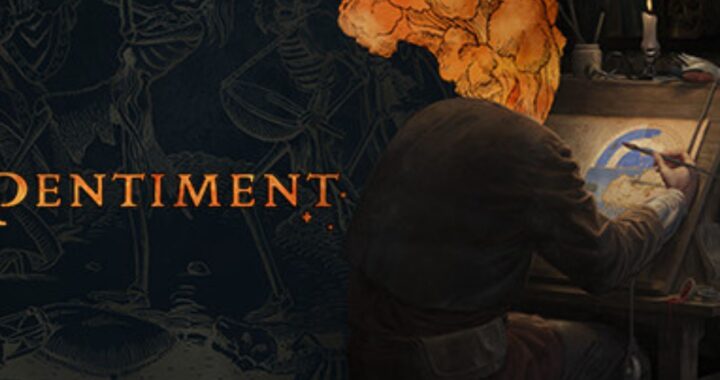
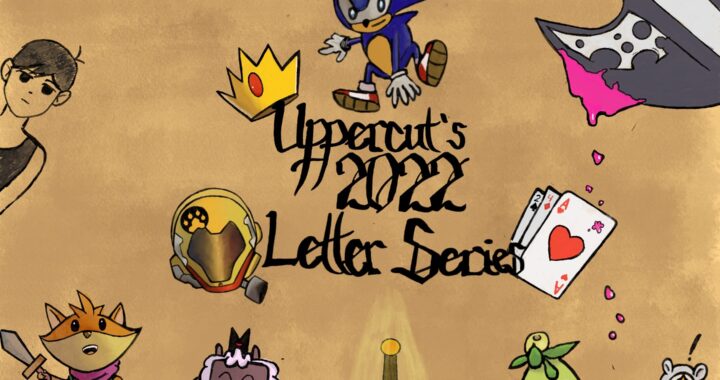
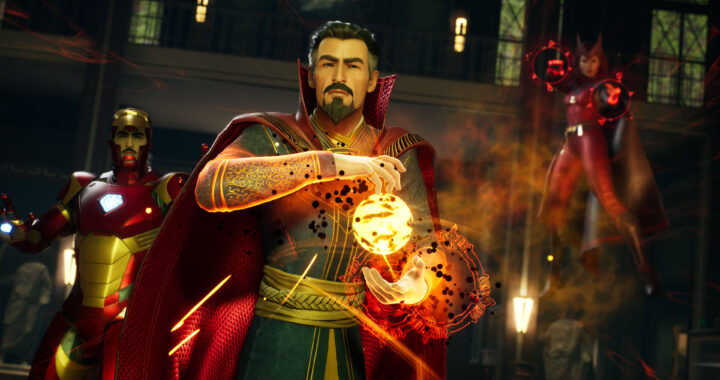
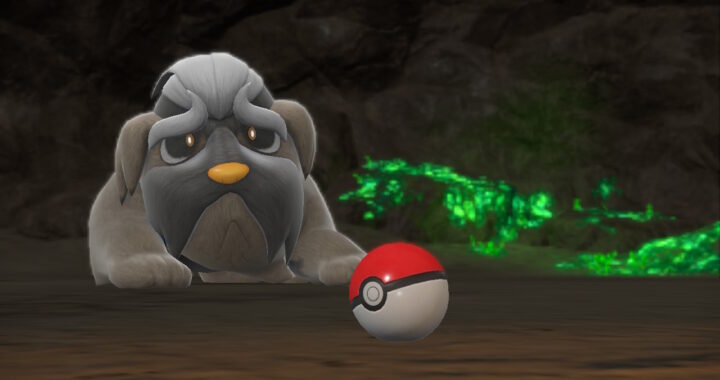
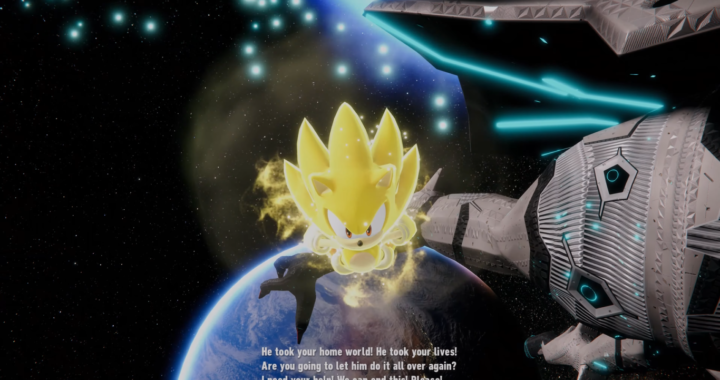
1 thought on “Omori: Notes on Mourning”